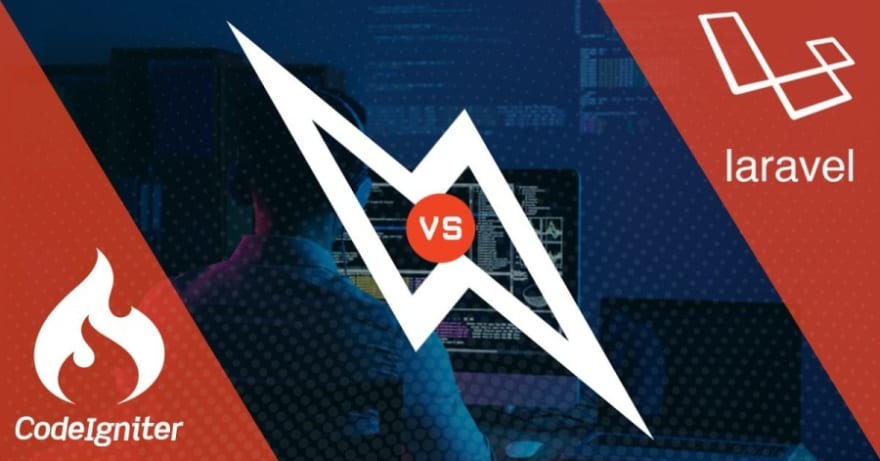
PHP is one of the most favored languages in a web development scenario today. This popularity has led to a rise in the number of PHP frameworks, which makes it easier for the expert PHP Developers to build a feasible solution for the business requirements. Codeignitor and Laravel are two such popular PHP frameworks with distinct advantages and disadvantages.
In this post, we will discuss the features and differences between these two PHP frameworks and try to ascertain where to use these frameworks more optimally.
Features of CodeIgniter
CodeIgniter is a popular PHP framework used in web application development. It helps in improving the speed of web development in PHP by its robust functionality and versatile features.
CodeIgniter follows the MVC (Model View Controller) pattern, which helps in making the process of web development more straightforward. Also, it allows developers to build secure web applications.
Let’s have a look at some features of CodeIgniter.
Low server requirement
CodeIgniter, through the MVC model, enables the developers to separate the code in a clear and easy to understand manner. It is compatible with PHP4 and PHP5 and allows the developers to build and manage large web apps.
CodeIgniter allows the developers to speed up the web development process by implementing database caching and page caching. These features help in caching the web pages in the fully rendered state. CodeIgniter even allows the developers to decide the time of caching.
Buttery smooth installation
CodeIgniter is a versatile framework as it provides plenty of freedom to the developers. The coders can bring variations like writing new code libraries in CodeIgniter. Being a small footprint framework, CodeIgniter is faster and is easy to install, which comes in very handy as the installation of frameworks can prove to be particularly challenging.
CodeIgniter helps the developers by providing built-in code libraries like zip-encoding, unit testing, and sessions uploading.
Simplified database editing
Codeigniter allows you to extract information from the database easily. This means that the developers can easily update the database without the need for writing raw SQL. With Codeigniter, the developers can easily edit the database and add or remove columns
Built-in security tools
CodeIgniter comes with some of the best security tools which help the developers in building secure web applications.
Features such as enabling cookie encryption and handling session data while using a database, empowers the developers. These features help the developers in choosing how much security does the web app need.
Better Error Handling Function
CodeIgniter has a robust error handling function that is user-friendly and helps the developers in identifying the errors in their code quickly.
Explore: Well-Researched List of Best CodeIgniter Development Companies.
Features of Laravel
Laravel is a popular open-source web development framework based on PHP. It was built to apply the concept of MVC in web application development. The fact that the framework is open-source and more secure has led to its immense popularity.
Let's have a look at some of the most exciting features of Laravel.
Modules
Laravel provides the developer with many pre-built modules and code libraries that help in building high-quality web applications. A composer dependency manager is provided in Laravel, which makes life easier for developers.
Easy scalability
Laravel enables the developers to define various routes which help in scaling up the application pretty fast.
Good testing features
Laravel helps the testers to test their web applications in a much faster and efficient manner by providing various test cases. A phpunit.xml file is integrated into your app and framework with helper methods. Thus allowing the developers to test their applications in a better manner.
ORM
Laravel provides features like ORM(Object-Relational Mapper) and a powerful query builder, which helps in managing large databases.
Explore: The List of Top Laravel Development Companies With Verified Client Reviews
Key differences between the two
Although both the platforms are very good for PHP application development, there are some critical differences between them let's discuss.
Support for PHP’s latest version
While both Laravel and CodeIgniter are compatible with the latest PHP version 7, many developers find it challenging to use CodeIgniter with PHP7.
Documentation
While the documentation of CodeIgniter is easy to understand, Laravel has extensive documentation.
Implementation of MVC
Both platforms use MVC patterns, which allows the developers to develop web applications in a fast manner. The only difference is that there is extensive documentation in the MVC pattern of Laravel.
While that of CodeIgniter is pretty easy to learn and implement. CodeIgniter allows the user to operate outside MVC, which is not the case with Laravel.
Usage of database structures
Laravel uses ORM, while CodeIgniter uses OOM(Object-Oriented Mapping). Laravel is better for relational data and will give better results with data sets that have some transparent relationships with each other.
For storing unrelated data like photos and videos, using CodeIgniter will prove a better option.
Libraries
The libraries of Laravel are extensive and well documented, which allows the developers to build faster by providing them with access to many building blocks. While in CodeIgniter, the libraries are not so extensive.
Support of community
Laravel has a much larger developer population than CodeIgniter, and hence the community support of Laravel is better than that of CodeIgniter.
Template engine
Laravel has the blade template engine, which provides robust support to developers and helps them in optimizing the performance of the website. While CodeIgniter does not have any template engine and the developer has to integrate CodeIgniter with other template engines.
Support for REST APIs
Laravel provides RESTful controllers, which enable the developers to build REST APIs quickly. The developers working with CodeIgniter have to put in significantly more effort to create custom REST APIs.
Learning curve
Laravel comes loaded with many features, and hence, it takes time to learn this language, while CodeIgniter is easy to learn.
Support for HTTPs
Laravel enables the developers to build custom HTTPs routes. Laravel provides the developers with the option of making a specific URL for every HTTPs route.
CodeIgniter lacks support for HTTPs route, here the developers have to manage the URL helpers to support secure data transmission.
Authentication
Developers can quickly implement authorization and authentication in Laravel, while in CodeIgniter, it is much more difficult as the developers need to write custom extensions for implementing authorization and authentication.
Verdict based on the Comparison between CodeIgniter and Laravel
For building simple websites that do not require the bells and whistles of an enterprise-level website, you can use CodeIgniter. The framework is easy to learn and implement, and the web application developed with Laravel will be able to run lightweight web applications efficiently.
For building enterprise-level websites that require integrating complex functionalities into a website, you should use Laravel.






Top comments (0)